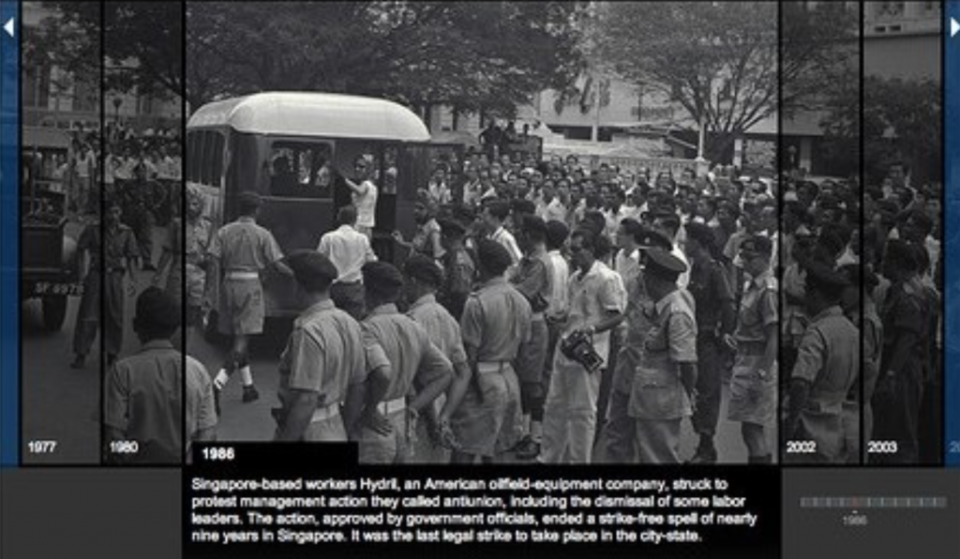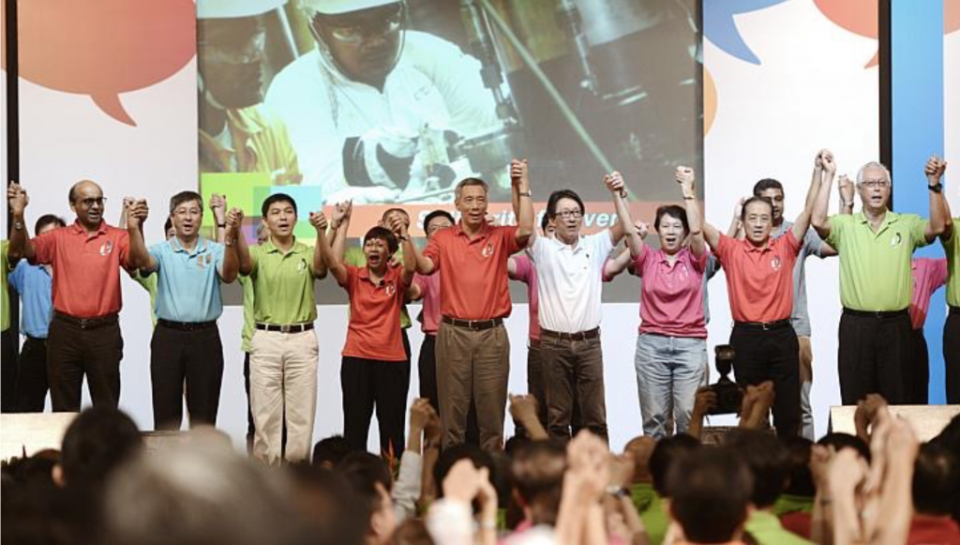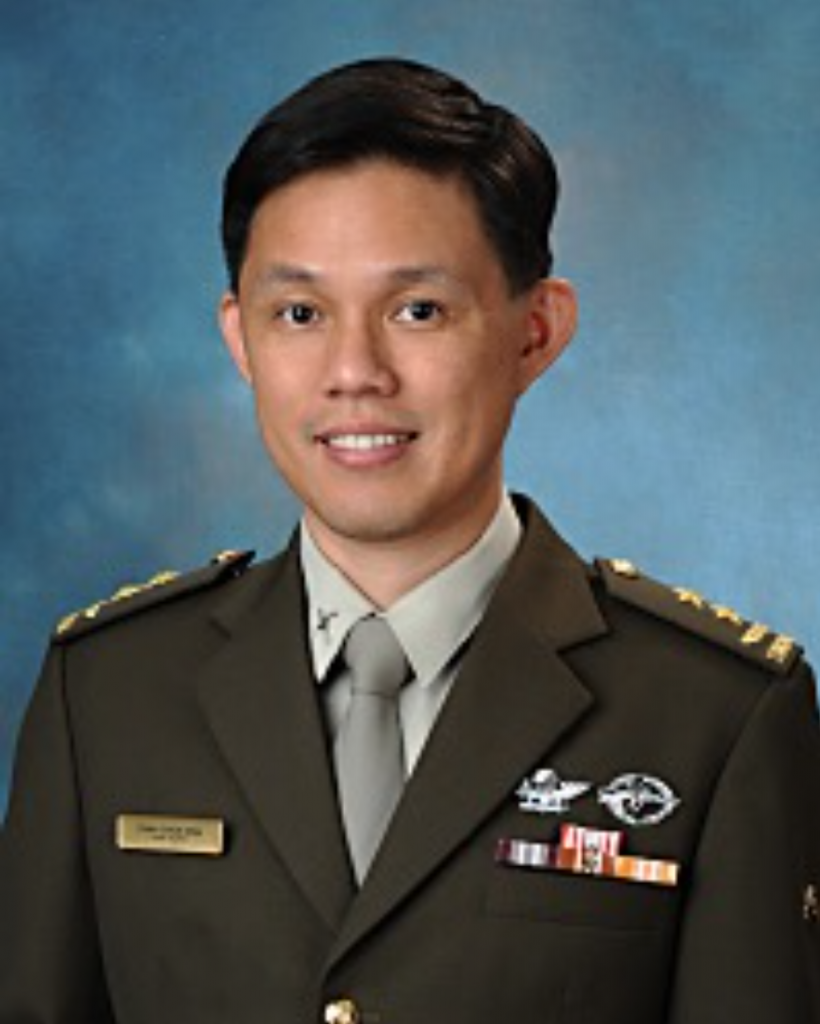10 Things You Didn’t Know About Singapore’s Labour Movement

It’s Labour Day! Singapore’s Labour Movement opened its month-long celebration for workers with a May Day Rally on the morning of 1st May, which will be followed by a three-day May Day Fiesta. But how much do you know about Singapore’s Labour Movement? Do you even know why Labour Day is such an important event? And why do unionists call one another brothers and sisters?
This Government will always be on the side of workers. This was Mr Lee Kuan Yew’s promise right from the start, and this…
Posted by Lee Hsien Loong on Friday, 1 May 2015
Here are 10 interesting facts about the Labour Movement that you probably didn’t know.
1. Why May Day Is So Important To The Labour Movement
We all know that the first of May, otherwise known as May Day or Labour Day, has always been a public holiday. It’s something we learnt growing up, that this is one public holiday that’s got nothing to do with racial or religious celebration.
But what is the history behind Labour Day, really? And why is it so important to the Labour Movement?
In the late nineteenth century, the working class was in constant struggle to fight for the 8-hour work day. Working conditions were really bad, and people were working 10 to 16 hours a day and under unsafe conditions too. It took a long time, with numerous protests and a bloody Haymarket Affair in 1886 for workers to really push through with the 8-hour work day system.
Since then, May Day (or Labour Day) has been a day of special significance for organised (i.e., unionised) workers around the world, as it serves to remind others of what their collective strength has achieved for workers. By making it a public holiday, the Government of Singapore intended it to be a day set aside in honour of workers and their contributions to the country.
Read more here.
2. Lee Kuan Yew Began His Political Career By Working With Unions
Everyone knows that the late Lee Kuan Yew first started out as a lawyer back in the 1960s. But what most people don’t realise is that Mr Lee first began his political career by working with local unions.
While employed at a law firm, Mr Lee acted as the legal advisor to the Postal and Telecommunications Uniformed Staff Union, fighting for better terms and pay. According to an article written by Lee:
“In February 1952, the President, Secretary, and several committee members of the Postal and Telecommunications Uniformed Staff Union looked for me. Amongst them was P Govindaswamy. The union was about to go on strike and needed someone to advise it, about its rights and duties, and to draft its press statements. I became their legal adviser to negotiate a settlement.
“(..) After three weeks of negotiations, the 500 postmen and their uniformed senior ranks, up to Inspector of Postmen, went back to work with every one of their demands conceded in full or in part. I had been seen as a radical but effective spokesman for the workers and a successful negotiator for the Union. These postal workers and their families were the first supporters to line up behind the PAP.”
Lee Kuan Yew went on to advise the Naval Base Labour Union in 1952, the clerical workers in the postal and telecommunications services who threatened to go on strike in 1954. Both situations ended peacefully in an arbitration, and the demands of the unions were met. By the time he led the PAP into Singapore’s first elections, his close ties with the unions and workers were already deeply rooted. This formed the foundation and his conviction of always remembering to serve workers well as they were, and still are, the bedrock of Singapore’s economy growth.
3. Hey, We’re All Brothers and Sisters!
If you’ve attended a May Day rally or any union event before, you would realise that many union members refer to each other as “brother” and “sister”. No, this isn’t a religious sect that you’ve stumbled into — “brother” and “sister” are actually traditional union salutations, used to create solidarity and a reminder that everyone in the working class are in the same boat. It also serves to remind workers to support one another beyond their own individualism.
Like other trade unions from yesteryears, The Singapore Labour Movement used to employ the term “comrades”, but they have since adopted the terms “brother” and “sister” instead. Even PM Lee is referred to as Brother Lee!
Talk about being part of a huge family.
4. Strikes Aren’t Illegal In Singapore
This is a common misunderstanding, but strikes are actually NOT illegal in Singapore. Strikes are also not necessarily the violent and society-harming movements that needlessly disrupt countries, but can be peaceful disruptions that help motivate change when all other methods have been exhausted. Yes, in most cases, strikes are the last weapon unions resort to when all else fails.
In 1986, Ong Teng Cheong, then Secretary General of NTUC, sanctioned a strike in the shipping industry. While it was organised without the cabinet’s approval, the Hydril Strike was a successful and peaceful one that eventually helped workers in the shipping industry have their needs met.
In an interview between Ong Teng Cheong and Adweek back in 2000, he explained why he believed the strike was a good move:
“I did not even tell the cabinet about sanctioning the strike. And some of them were angry with me about that. The minister for trade and industry was very angry, his officers were very upset. They had calls from America, asking what happened to Singapore? — we are non-strike. I said: if I were to inform the cabinet or the government they would probably stop me from going ahead with the strike. It only lasted two days. Then all the issues were settled. It showed that management was just trying to pull a fast one. So I believe what I did was right.”
Ong Teng Cheong went on to become the President of Singapore from 1993 to 1999. And while independent Singapore can’t claim to be strike-free, the Hydril strike he sanctioned shows how successful strikes can be when legitimised and approached through appropriate avenues. And more importantly, it showed that the Labour Movement always has the workers’ interests at heart, and would pull no punches if the occasion calls for it.
5. Unions Are Not Just for Rank-and-File Workers
We know how Singapore’s unions are able to stand for specific sectors and workers, like taxi drivers, low-wage workers, cleaners, or shipyard workers. But what about Professionals, Managers and Executives (PMEs)?
Well, with a new amendment to the Industrial Relations Act that took effect from 1 April 2015, Singapore’s unions will be able to represent PMEs to make sure that their employment rights are protected as well.
About time too, since there has been increasing work-related grouses from PMEs. Younger PMEs are facing pressure from foreign talents, and mature PMEs are finding it hard to secure jobs of the same pay after they have been displaced. If NTUC can also represent PMEs in cases of employment disputes, grievances or even to fight for retrenchment benefits, that would be added protection for PMEs.
In addition, the Labour Movement is also planning to help workers, including PMEs, grow to ensure that they are FutureReady. NTUC is an integral part of why SkillsFuture has been implemented by the government. This initiative was approved in this year’s Budget, giving Singaporeans aged 25 and above an initial credit of $500 to use in a range of courses supported by government agencies.
If you are a PME earning a basic monthly salary of up to $4,500, employed in a non-unionised company and have joined any registered trade union as an individual member, you can also apply for tripartite mediation for employment disputes salary arrears, payment of retrenchment benefits, and breach of individual employment contracts with your trade union. You can visit the MOM website for more info.
6. Unions Care and They Help Workers in Need
While many may think that being part of a union just means getting more benefits or ‘Link Points’, there are actually many situations where unions do step in to help out their members in need.
In a story shared on TheNewAgeParents, a 27-year-old childhood educator who had cleared her probation of six months was terminated when she informed her company about her pregnancy. While they put the blame on “poor performance”, they had never raised issues about her performance before. Concerned that she wouldn’t be able to cope financially, she emailed the Education Services Union for help. They lodged her case with MOM and helped her get two months’ ex-gratia payment and another 8 weeks of government-paid maternity payment from her company.
While these cases aren’t often shared with the public, many members have received help and support from their unions. For instance, NTUC GIFT, the group insurance for all union members, have helped many families when their sole breadwinners pass away. Other assistance programs such as hardship grant, bursary awards for members’ children, as well as NTUC Back to School vouchers have also helped many members and their families through the years.
7. Ex NTUC Sec-Gen Lim Swee Say Had To Have His Wife’s Approval To Enter Politics
Outgoing NTUC Secretary General Lim Swee Say has held his position since 2007, but his entry into Singapore’s political scene dates back to as early as 1997, when he was a winning PAP candidate in Tanjong Pagar GRC.
But before he joined politics, Mr Lim shared that he first had to ask permission from his wife. In an episode of ‘Hear Me Out’, a talk show on Mediacorp‘s Channel 8, Minister Lim shared how his wife had first been reluctant to agree to him joining the political scene, and had taken several weeks to agree, albeit tearfully.
As translated by Mothership.SG, when Minister Lim asked her why she was crying, she said, “‘I agreed because I felt that it was a good thing if you could contribute more. Therefore, I agreed. At the same time, I know that the time we (Lim’s family) spend with you is already very little, after you enter politics our family will be seeing even less of you.”
She said, ‘Okay. Go enter politics and try your best. But remember, the most important thing is not to forget this family.”
And, as he said in a previous interview with Mothership back in September last year: “Once a labour leader, forever a labour leader. Your heart will be with the labour movement.”
With that, we can expect that with his move to the Ministry of Manpower from 4 May 2015, Minister Lim will not forget his Labour Movement roots and can be expected to tripartise everything.
8. Chan Chun Sing’s Humble and Diverse Background
As Minister Chan Chun Sing steps into the rather large shoes of soon to be Ex Sec-Gen Lim Swee Say, many are questioning his move due to Minister Chan’s (tender) age and (lack of) experience on the labour front. But interestingly enough, MP Chan comes from an unexpectedly humble and diverse background.
Coming from a single-parent family, he worked his way up to study economics in the University of Cambridge with the President’s Scholarship and Singapore Armed Forces Overseas Scholarship, graduating with first class honours. He worked with the SAF for 25 years, eventually moving up to the rank of Chief of Army before joining politics.
While he was with the Ministry of Social and Family Development (MSF), he had implemented many good things. He has also been the chairman of the National Taxi Association since 2013, where he has had regular coffee meetups with taxi drivers to understand their concerns.
“He helps us make appeals to the taxi company and the authorities on matters like taxi rentals and Electronic Road Pricing charges,” said taxi driver Ken Chin, an NTA branch official, in an interview.
He relinquished his ministerial post with MSF in April, and moved over to NTUC to head the Labour Movement. With effect from 4 May 2015, Minister Chan will become the new Labour Chief.
But his dream career as a child? A Librarian.
9. Singapore’s Unions Are Not Run By The Government
While NTUC and the Ministry of Manpower (MOM) work closely together to better workers’ lives, unions in Singapore are not governed by the MOM. The registrar of trade unions is staffed by MOM, but unions are actually free entities, and they operate independently to improve the livelihood and welfare of Singapore’s workers.
One of NTUC’s main beliefs, which keeps them working closely with government bodies, is that of Tripartism, the harmonious cooperation of three partners — NTUC, MOM, and Singapore National Employers Foundation (SNEF) — to ensure that Singapore maintains economic competitiveness and harmonious labour-management relations.
The belief that working together would solve issues more efficiently than an antagonistic relationship forms the foundation of Singapore’s Labour Movement. This may not be something that everyone agrees on, but undeniably, the tripartite model has proven to work and has served Singapore well through the years.
As outgoing NTUC Secretary General Lim Swee Say said in a wide-ranging interview on Monday:
“Our tripartism will come under more stress, not less, but probably more than tripartite partners in other countries, because we are small, because we are an export-oriented economy. So we are a lot more exposed to what is happening out there in the world. So we will come under — in fact, we have been coming under much greater stress,” said Mr Lim.
“But so far, we have been able to stand up to all these global challenges, whether it is the Asian Financial Crisis or Global Financial Crisis. So looking ahead, it is important that we must continue to move ahead, look ahead and work together.”
BONUS!!
10. NTUC Is Not A Union
Surprise surprise! While NTUC (National Trades Union Congress) is an important part of the Labour Movement in Singapore, it is however not a union.
Unlike the myth about how NTUC is the only union in Singapore, NTUC is in fact a federation of trade unions. It does not have union members; instead, NTUC works closely with trade unions and associations affiliated to it, such as the Singapore Teacher’s Union (STU), the Amalgamated Union of Public Employees (AUPE) and even the National Taxi Association (NTA).
Still, NTUC plays a significant role in the Labour Movement, as it works very closely with its affiliated unions and associations to fight for higher wages for the workers, as well as to protect workers’ rights, including improving their welfare and working conditions. Notably, it has officials sitting in government to give workers a voice in the process of policy-making.
Currently, NTUC represents some 850,000 workers in Singapore across more than 80 unions, associations, and related organisations.
Also Read: GeekGirl By Day, DJ By Night, Second Skilling Lets Sabrina Do What She Wants In Life!
The post 10 Things You Didn’t Know About Singapore’s Labour Movement appeared first on Vulcan Post.













